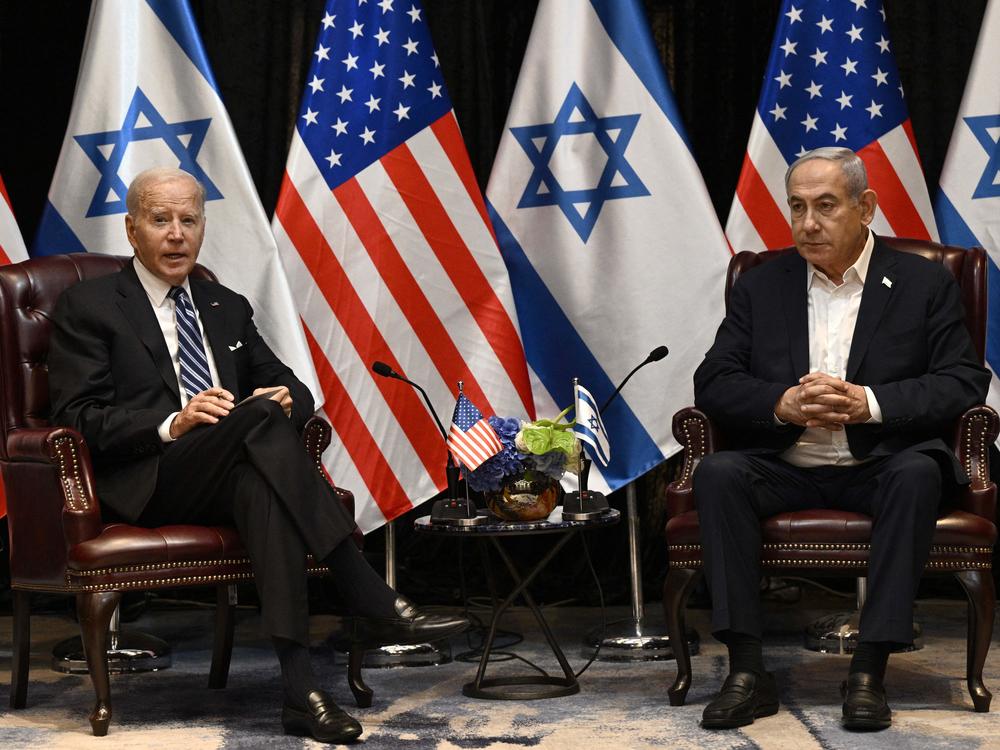Section Branding
Header Content
Israel's Benjamin Netanyahu can expect a mixed reception as he addresses Congress
Primary Content
Israel's Prime Minister Benjamin Netanyahu faces a long list of critics over the war against Hamas in Gaza. They include fellow Israelis demanding a deal to bring Israeli hostages home, as well as many nations that are moving to isolate Israel internationally.
But on Wednesday afternoon, Netanyahu will speak in one of the few places he can count on for support — among Republicans in a joint meeting of the U.S. Congress.
Yet even in Washington, he'll face a growing number of critics among Democratic lawmakers, as well as protests expected in the streets.
On his flight to Washington on Monday, Netanyahu had a baseball cap emblazoned with the words "Total Victory" — which sums up his belief that Hamas must be completely destroyed in Gaza. This is likely to be a central theme in his speech.
While President Biden supports Israel's war aims, he's also pushing for a cease-fire that's been under discussion for months. There's no sign of an imminent breakthrough, though Netanyahu is sending Israeli negotiators back to Qatar on Thursday for another round of talks.
In addition to his speech on Capitol Hill, Netanyahu is expected to meet with Biden and Vice President Harris, and possibly with former President Donald Trump. Yet all these meetings could come with sticking points.
Biden is frustrated with the way Israel is prosecuting the war, particularly when it comes to the high Palestinian civilian death toll. Gaza's Ministry of Health said recently the number of Palestinians killed in the territory has surpassed 39,000. The ministry does not distinguish between civilians and militants, but it says women and children account for well over half of the dead.
On the rare occasions when foreign leaders address the U.S. Congress, the U.S. vice president traditionally sits behind the speaker. However, Harris is scheduled to travel to Indianapolis on Wednesday. She is expected to meet Thursday with Netanyahu. The vice president's public statements on the Israel-Hamas war have been in line with Biden's, and it's not yet clear whether she might stake out her own position if she becomes the Democratic presidential nominee.
Dozens of Democrats expected to boycott
The events of the last ten days — including an assassination attempt on Trump, the Republican convention, and Biden’s decision to withdraw from the race and endorse Harris — have dominated the news cycles and left less political oxygen on Capitol Hill for concerns about how Netanyahu's speech could highlight divides among Democrats when it comes to U.S.-Israel policy.
There will be notable absences in the chamber when Netanyahu delivers his address. Dozens of Democratic lawmakers, including Senate President Pro Tempore Patty Murray, D-Wash., and Majority Whip Dick Durbin, D-Ill., are expected to sit his speech out.
“I personally will not be attending. I think that to come before the United States Congress is a tremendous honor. It's indicative of a functional working relationship, and personally, I don't believe that the prime minister has lived up to that,” New York Rep. Alexandria Ocasio-Cortez told NPR. “I have extraordinary concerns and I don't want to affirm or legitimize this with my presence.”
Maryland Rep. Jamie Raskin said for those wary of attending the speech, there’s advantages and disadvantages to going.
“To me, it's a lot like whether or not to go to the State of the Union back when Donald Trump was president. I mean, the difficult part is that you're like a jack in the box, popping up and down, because the speeches are written in such a way that either you clap or you're a Martian,” he told NPR. “That's the problem with going. But the problem with not going is that you don't see what's happening and you're not able to immediately engage with it and respond to it.”
The phrase many Democrats kept repeating in the lead-up to Wednesday’s speech was “members have to do what members feel is right.”
“That’s what democracy’s about,” said New York Rep. Gregory Meeks, the ranking Democrat on the House Foreign Affairs Committee. “You do what you think is the right thing for you to do. I will be in the audience listening to the prime minister — I think that’s what my responsibility is.”
Florida Rep. Jared Moskowitz said he thinks it’s a “mistake” for members to boycott the speech.
“You don't have to support a particular leader, but you should support a country — a country is bigger than a particular leader,” he said. “When Donald Trump was president, even if you disagreed with him, you didn't boycott America.”
North Carolina Rep. Kathy Manning pointed out that even with some defections, the actions of Congress speak to broad backing for Israel.
“I don't think it makes that big of a difference,” she said. “There is strong bipartisan support of the state of Israel. We've seen it with all the votes that have taken place and we've seen it with the supplemental funding.”
In April, the House voted to allocate $26 billion in aid for Israel, setting up a vote for final passage. Thirty-seven Democrats voted against the aid.
Netanyahu's relationship with Trump and Biden
Meanwhile, the Trump-Netanyahu relationship soured after the 2020 U.S. presidential election. Netanyahu recognized Biden as the winner, a move that angered Trump, who falsely claims the balloting was rigged against him.
Biden remains a strong supporter of Israel, and the U.S. continues to supply its ally with weapons, though the U.S. president has distanced himself somewhat from Netanyahu.
Biden still talks about backing Israel a half-century ago during its war against Egypt and Syria in 1973. This was Biden’s first year in the Senate, and that conflict helped shape his views on the Middle East.
But during his final months in office, Biden is expected to keep pressing for a truce in Gaza, and he also wants to see an Israeli plan for the territory after the fighting stops. Israel says Hamas must never be allowed to rule Gaza again, but has not yet offered a plan on who might run the territory in the future.
Biden, meanwhile, wants to keep the fighting in the wider region from escalating.
On the diplomatic front, Secretary of State Antony Blinken and CIA Director William Burns are regular visitors, while on the military side, the U.S. Navy is still in the Red Sea trying to keep shipping lanes open and countering attacks by the Houthi militia in Yemen.


